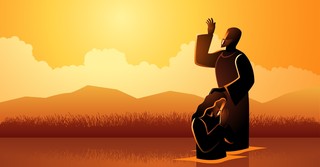3 Standout Lessons in Faith from John the Baptist
Share

Old Testament prophets spoke of a man who would carry a message that God’s people would be eagerly awaiting - the coming of the Messiah.
“A voice of one calling: ‘In the wilderness prepare the way for the LORD; make straight in the desert a highway for our God’” (Isaiah 40:3).
“’I will send my messenger, who will prepare the way before me. Then suddenly the Lord you are seeking will come to his temple; the messenger of the covenant, whom you desire, will come,’ says the LORD Almighty” (Malachi 3:1).
This man would also have a ministry of his own, preparing the hearts of those who listened to receive their Savior. His name was John. Later, the word “baptist” (which means “immerser” in Greek) was added because he performed water baptisms.
Who Was John the Baptist?
John's parents, Zachariah and Elizabeth, lived in the hill country of Judea. Zachariah was a priest, and according to Scripture, they were a devout couple who faithfully followed the Lord’s ordinances. Elizabeth was actually descended from the line of Aaron, and was a cousin of Mary, the mother of Jesus. So, John and Jesus were cousins, only months apart in age.
John's birth was divinely foretold, and his name was given directly by God. An angel visited Zachariah at the temple one day to announce Elizabeth’s pregnancy. Because Zachariah reacted with disbelief at the news, his voice was taken away until the birth of his son. When his tongue was loosed, his first words were, “His name is John.” In Hebrew, the name means “Jehovah is gracious.” Zachariah, back in full voice, lifted up joyful praise to God and spoke over his son in a beautiful song:
“Praise be to the Lord, the God of Israel, because he has come to his people and redeemed them. He has raised up a horn of salvation for us in the house of his servant David (as he said through his holy prophets of long ago) ... And you, my child, will be called a prophet of the Most High; for you will go on before the Lord to prepare the way for him, to give his people the knowledge of salvation through the forgiveness of their sins…” (Luke 1:68-70, 76-77).
As foretold, John’s lifestyle kept him removed from regular society. He dressed as many Old Testament prophets did, in rough basic clothing - his was made of camel’s hair. According to Scripture, he ate locusts and wild honey like other poorer people in the region. But even after years of avoiding the mainstream, he ended up impacting many from all walks of life when the right time came.
Just as the prophecies said, John’s ministry was built around the message of God’s salvation and living righteously: “Produce fruit in keeping with repentance” (Luke 3:8). He traveled in the country around the Jordan River, preaching and baptizing the crowds who came to hear him.
When asked by people about what they should do, he gave instructions such as, “Anyone who has two shirts should share with the one who has none, and anyone who has food should do the same” (Luke 3:11). To tax collectors he advised, “Don’t collect any more than you are required to…” (Luke 3:13). Soldiers who went to him heard this command, “Don’t extort money and don’t accuse people falsely — be content with your pay” (Luke 3:14).
John’s ministry and life was cut short when he was arrested by Herod, one of the rulers in the region. John had told Herod that taking his brother's wife was unlawful, which angered the tetrarch. John was put into prison, and later beheaded.
Though it ended tragically, John the Baptist’s life is a powerful example of a life fully given over to God. As I’ve studied about him in Scripture, I’ve noticed three qualities about John that especially stood out.
1. His Faith
“Now this was John’s testimony when the Jewish leaders in Jerusalem sent priests and Levites to ask him who he was. He did not fail to confess, but confessed freely, ‘I am not the Messiah.’ They asked him, ‘Then who are you? Are you Elijah?’ He said, ‘I am not.’ ‘Are you the Prophet?’ He answered, ‘No.’ Finally they said, ‘Who are you? Give us an answer to take back to those who sent us. What do you say about yourself?’ John replied in the words of Isaiah the prophet, ‘I am the voice of one calling in the wilderness, ‘Make straight the way for the Lord’” (John 1:19-23).
John quoted the passage from Isaiah 40 to answer the religious leaders about his identity. Being the son of a priest himself, he no doubt spent his childhood learning Old Testament accounts about God and His people. Prophecies and promises must have been stored up in his mind and heart.
But John did more than just repeat what he’d heard. His parents’ faith was a solid foundation. Then, as he walked through life with God, his parents’ legacy became his own personal belief. Living in the wilderness, away from the influences of society, must have helped him to stay directly connected to his Lord.
By the time he began his ministry, John was filled up with knowledge and passion about God’s saving grace. His journey of faith equipped him to proclaim his message, and the conviction he felt added power to his cry to repent.
2. His Humility
“John answered them all, ‘I baptize you with water. But one who is more powerful than I will come, the straps of whose sandals I am not worthy to untie. He will baptize you with the Holy Spirit and fire’” (Luke 3:16).
Having your life call being spoken of in ancient prophecies could be an overwhelming thing to handle. But John seemed to carry it all with a sense of dignity and self-awareness. He clearly understood who he was, and more importantly, who he was not.
This humility served him well all through his ministry. As others flocked to him, he took the chance to give glory to God rather than accept accolades. When Jesus came to seek baptism from him, John recognized the enormity of the moment, and was astonished by the honor of it.
“But John tried to deter him, saying, ‘I need to be baptized by you, and do you come to me?’” (Matthew 3:14).
Later, when John’s disciples worriedly report that people were beginning to go to Jesus for baptism instead of them, John’s reply reveals a man who knows his place and is content with that.
“He must become greater; I must become less” (Luke 3:30).
3. His Obedience
“He went into all the country around the Jordan, preaching a baptism of repentance for the forgiveness of sins” (Luke 3:3).
“Paul said, ‘John’s baptism was a baptism of repentance. He told the people to believe in the one coming after him, that is, in Jesus’” (Acts 19:4).
Though John’s life had been anointed for God’s purpose, he could have chosen another path. But John made decisions all along the way to follow God’s plans rather than his own. He knew the urgency of the message he spoke, and felt the anticipation of what, and who, was to come.
This submission to his Lord was deeply rooted and stood firm, through his early hardships in the wilderness to his suffering in prison. Though he reached out to Jesus for reassurance during that confinement, John never lost sight of his duty. The cost - losing his freedom, and ultimately his life - was worth it if God was glorified.
John the Baptist was given the great task of announcing the coming of Jesus. The message he spoke, one of living repentantly and rightly, is one the world still needs to hear. If we are willing to cultivate those qualities that John displayed, God will give us places to speak our Savior's name and His truths. Then we will each have a more impactful ministry to those around us.
Photo credit: ©Getty Images/rudall30
